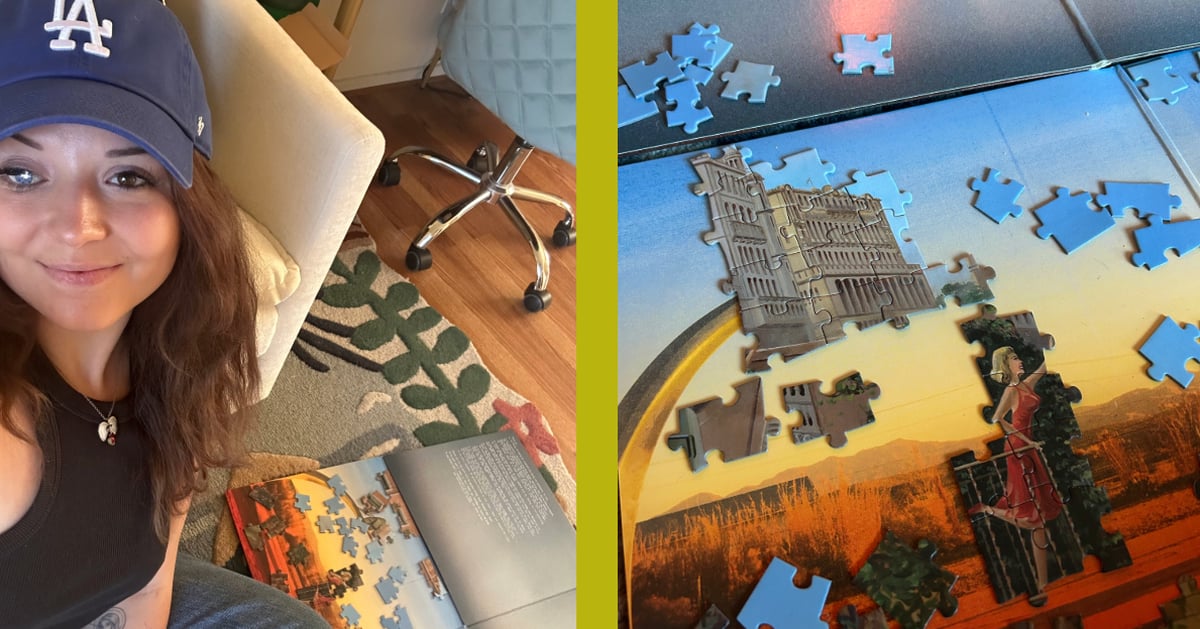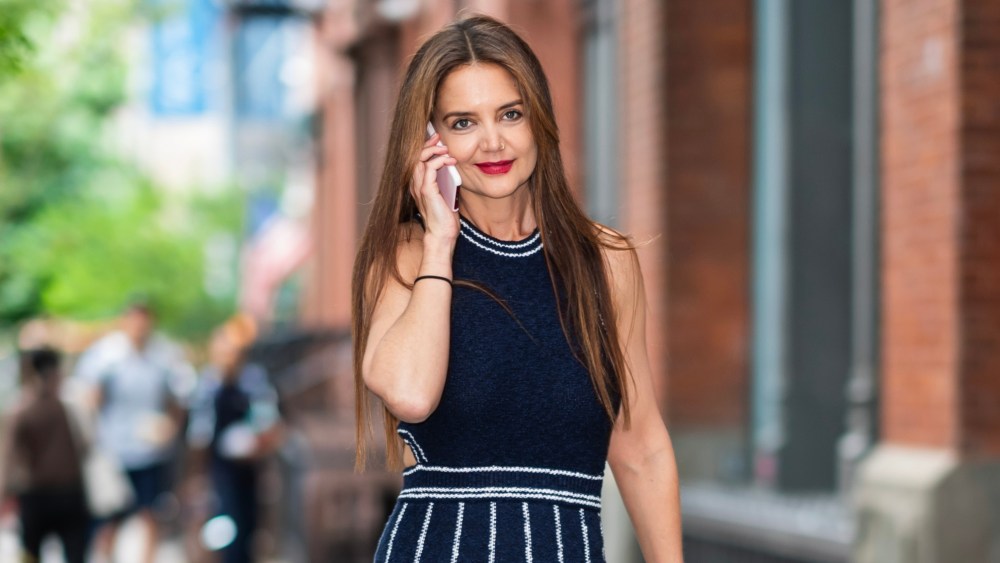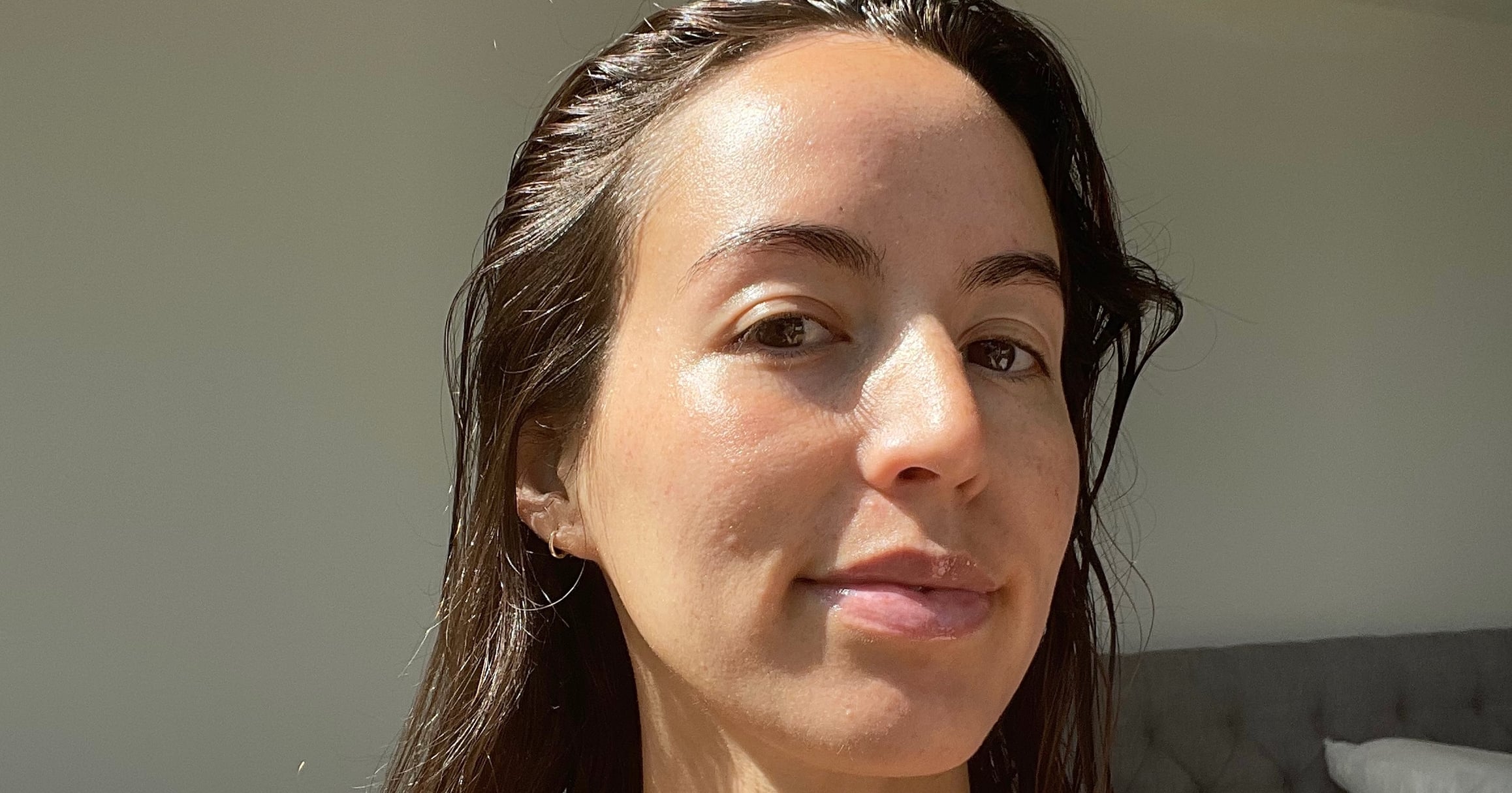Hi, my name’s Chandler and I’m a puzzle hater. Truthfully, I don’t know how I got to be this way. My mother often spends her entire mornings hunched over a puzzle board, gleefully piecing together a 1000-piece winter landscape. Meanwhile, I sit somewhere nearby and stare at my phone. I like to think we’re equally content; her organizing puzzle pieces by hue, and me doom-scrolling through my FYP. But I’m beginning to suspect I might be missing out.
Plagued by these suspicions, I spoke with a puzzle rental subscription service called Completing the Puzzle. The brand talks about puzzles, not as a boring chore (as I might describe them), but as a mindful hobby that can slow racing thoughts, reduce anxiety, and serve as a (screen-free) mental reset. Intrigued by these alleged mental health benefits, I decided to try puzzling for my mental health for a full week. Read on for the results of my mini puzzling experiment, plus some helpful tips and takeaways from puzzle pros.
Why Puzzles?
Despite having grown up around puzzling, Cathrin Manning didn’t officially re-visit the hobby until she found herself needing a bit of a digital detox. “I use puzzling now as my way to not look at a screen,” she says. “It’s almost meditative for me.” At the same time, Manning makes it a point to puzzle in peaceful environments, never rushing herself. One rainy day, she listened to all the Marvel movies in chronological order while puzzling. “I don’t puzzle for sport, I puzzle for leisure,” she explains.
“I don’t puzzle for sport, I puzzle for leisure.”
Rebecca Brunson describes a similar re-introduction to puzzling. Prior to picking up a holiday-themed puzzle at the store, she hadn’t touched one in nearly 10 years. But she quickly found herself hooked again, puzzling during breakfast, staying up late to work on the puzzle, and searching for pieces throughout the day. “It occurred to me that I was using it as stress relief,” Brunson says. “Anytime I got frustrated or something became too much, all I wanted was [to] go do my puzzle.”
Chloe Solane relates to these calming effects, as did her grandmother. Solane says they would often puzzle together, oftentimes getting lost in them. Looking back, she suspects the hobby was a good way for her grandma to find some mental peace. “Assembling puzzles can require intense focus, which in turn, helps to silence the internal noise,” Solane says. “You notice it when you’re young, but it’s definitely more helpful in adulthood.”
Tips From Puzzle Pros
As I prepared to embark on my own puzzle journey, I asked these puzzle pros if they had any recommendations. Here are seven tips they’d give to puzzling newbies like me:
- Go slow: There’s no point in rushing your puzzle – especially if you’re trying to reap some mental health benefits. “There’s no pressure to finish quickly,” Brunson says. “It’s nice to just slow down and do something at [your] leisure.”
- Start small: It might be tempting to reach for the most advanced puzzle you can find, but Solane recommends mastering a puzzle with a couple hundred pieces first. “I was a bit overzealous and purchased a huge puzzle when I got back into it a couple years ago,” she says. “I never finished it.”
- Create a cozy puzzling space: It’s easier to puzzle for mental health if you have a space you look forward to puzzling in. “Put on a podcast, put on a movie. Something in the background that you can still listen to,” Manning suggests.
- Invest in high-quality puzzles: “Not all puzzles are created equal, and it’s very frustrating when you get a cheap puzzle and the pieces don’t quite fit together,” Brunson says. She likes the brand Eurographics (and I can also vouch for the Spilsbury puzzle I received from Completing the Puzzle).
- Don’t force yourself to finish: It’s OK if you don’t end up loving the puzzle you’re working on. “Don’t put too much pressure on yourself to finish every puzzle you start,” Solane says. “Life is too short to keep working on one that you’re not committed to any longer.”
- Find puzzle styles you like: “I think it’s really important to find a style of puzzle that you enjoy doing because you are more likely to go back to it,” Brunson says. For example, Manning likes color-blocking puzzles, while Solane prefers puzzles with cozy or holiday-themed graphics.
- Work from the outside-in: “Piece together the border first,” Solane advises. “It makes it easier to see how [the puzzle] will come together, and it feels less daunting.”
My Experience
It may sound silly, but I legitimately dreaded this experiment. I felt a bit overwhelmed, and reluctant to give up my usual morning screen-time. I also didn’t have a puzzle board, so I had to work on top of old vinyls (which actually proved to be a fine solution). In an effort to motivate myself, I took the puzzle pros’ advice and set the stage: iced coffee, pumpkin candles, and “Gilmore Girls” on the TV. Now in full-blown cozy mode, it was easier to get started.
I began by finding all the edges in my 300-piece puzzle. But to be honest, this didn’t prove to be tremendously helpful. What worked better was sorting the puzzle pieces by color or pattern, and then completing small chunks at a time. In the beginning, I frequently fought the urge to quit (or better yet, jam the pieces together with force). But as the week went on, I found myself looking forward to my screen-free mornings. The dopamine I got from piecing together even a small section of the puzzle was far better than the doom-scrolling I had grown accustomed to. Time flew by, and I noticed myself wishing my puzzling sessions were longer.
My Takeaways
As a former puzzle hater, I feel like I made a lot of progress in a short amount of time. While I still found the act of puzzling a little frustrating, this experiment gave me a new mindful hobby to turn to – one that offers some much-needed reprieve from the internet. I definitely related to the puzzlers who felt more grounded after puzzling, and was genuinely surprised that I found such a good flow over the course of the week. I wouldn’t call it a quick fix or a magical cure-all, but overall, puzzling helped me feel happier, calmer, and clearer – all of which are huge wins for my mental health.
Chandler Plante (she/her) is a social producer and staff writer for the Health & Fitness team at Popsugar. She has over five years of industry experience, previously working as an editorial assistant for People magazine, a social media manager for Millie magazine, and a contributor for Bustle Digital Group. She has a degree in magazine journalism from Syracuse University and is based in Los Angeles.




